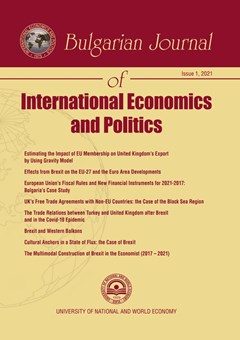Estimating the Impact of EU Membership on United Kingdom’s Export by Using Gravity Model
Estimating the Impact of EU Membership on United Kingdom’s Export by Using Gravity Model
Author(s): Elena Makrevska Disoska, Katerina Toshevska-Trpchevska, Irena Kikerkova, Jasna TonovskaSubject(s): Politics / Political Sciences, Politics, Economy, National Economy, Supranational / Global Economy, Business Economy / Management, International relations/trade, EU-Approach / EU-Accession / EU-Development
Published by: Университет за национално и световно стопанство (УНСС)
Keywords: United Kingdom’s export; EU membership; free trade agreements; gravity model; Brexit
Summary/Abstract: After a year from the formal UK withdrawal from the EU, there are still different opinions about the potential economic impact of Brexit. This paper gives a detailed overview of thetrade profile of UK and explores the determinants of United Kingdom`s export. We apply the gravity model to estimate the aggregate benefits of EU membership or the reversed,lost (foregone) benefits from leaving the EU. We measure the influence of GDP, distance,population, the EU membership, and signed free trade agreement with the trading partners on UK’s export as a dependent variable. The analysis includes data for 70 UK trading partners in a period of 48 years (from 1973 to 2020) since Great Britain become EU member.The results show that UK’s export is directly proportional to trade partner’s GDPand inversely proportional to distance. In order to estimate the average benefit due toEU membership, we estimated subsequent equations with different time periods. The coefficient decreases and becomes negative as we shorten the time periods, proving that the average trade advantage due to EU membership diminishes over time. According to the economic theory of regional integration, it is expected that the coefficient increases due to many rounds of enlargement, especially the biggest one in 2004 as well as due to the introduction of the Euro. On the contrary, as we shorten the time periods in the analysis,we obtained increasing coefficient for the variable free trade agreements. This confirms that trade exchange within FTA has significantly higher effect on United Kingdom’s export in comparison with trade within EU.
Journal: Bulgarian Journal of International Economics and Politics
- Issue Year: 1/2021
- Issue No: 1
- Page Range: 7-16
- Page Count: 10
- Language: English

